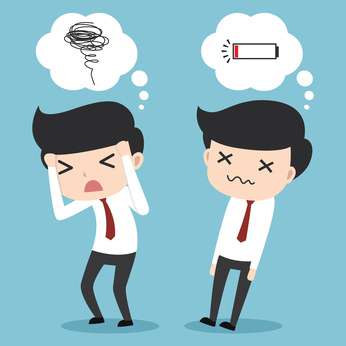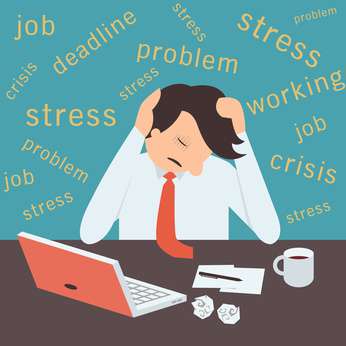"Stress" is a word often bandied around without much thought—when our unreliable computer is really "stressing us out"—for example.
But rarely does a dodgy desktop cause any proper psychological damage. So what is stress, really?
Mind.org.uk describes it as a feeling of being overwhelmed. A sort of thick fogginess which can be hard to see past and might, eventually, impact our physical wellbeing. Stress comes about through pressures that we face in life and our reaction to those pressures.

So which situations are believed to place the most mental burden on us? The Holmes and Rahe Stress Scale—one of the more widely used stress measurement tools in the US—looks at various triggers, labelled Life Change Units (LCUs), and allocates a point score to each. Totting up the figures then allows the subject to give his or herself an overall stress rating, in the hope of nipping future health issues in the bud.

If you'd like to learn more about managing your stress, why not take a look at how we can help?
Reduce your stress for a happier life with our online courses.
RRP from $89 – limited time offer just $12.99
According to the Scale, the 43 most significant triggers in life are [1]:
- The death of spouse (100)
- Divorce (73)
- Marital separation (65)
- A jail term (63)
- The death of close family member (63)
- Personal injury or illness (53)
- Marriage (50)
- Losing your job (47)
- Marital reconciliation (45)
- Retirement (45)
- Change in health of family member (44)
- Pregnancy (40)
- Sexual difficulties (39)
- Gaining a new family member (39)
- Business readjustment (39)
- A change in financial state (38)
- The death of close friend (37)
- A change in career (36)
- Arguing more or less with a spouse (35)
- A large mortgage or loan (31)
- Foreclosure of mortgage or loan (30)
- A change in responsibilities at work (29)
- A son or daughter leaving home (29)
- Trouble with in-laws (29)
- Outstanding personal achievement (28)
- A spouse beginning or stopping work (26)
- Starting or leaving school/college (26)
- A change in living conditions (25)
- Changing personal habits – i.e. quitting smoking (24)
- Difficulties with a boss (23)
- A change in work hours or conditions (20)
- A change in residence (20)
- Changing school/college (20)
- Changing leisure activities (19)
- A change in church activities (19)
- A change in social activities (18)
- A moderate loan or mortgage (17)
- Disturbed sleeping habits (16)
- A change in number of family get-togethers (15)
- A change in eating habits (15)
- Planning or going on holiday (13)
- Christmas (12)
- Minor violations of the law (11)
What's interesting is that some of these would appear to be good things. Planning or going on holiday, as well as Christmas, should be good things in our lives, right?
Yet, despite being good things, they still cause stress!
A second really interesting thing to note is how some "groups" appear. For example, death appears on the list on multiple occasions, and has different scores, depending on who has died. Similarly, any kind of change appears many times.
This would indicate that often, it's not just about the nature of the event itself, but the type of the event, that can cause stress.
Now, while some individuals may find that their own personal impact by these factors is different to this list, as an average for all society, they do tend to be valid.
Holmes and Rahe were able to test their hypothesis on US submarine staff. Working in a contained environment for up to six months, with no capacity for external illnesses to hit some and not others, the submariners could be assessed to see who was ill over the period, and who had experienced which elements of the list within 24 months prior to departure. (Should you be interested in this, try reading Future Shock by Alvin Toffler. While some of his predictions have not come to pass, and some others were simply wrong, overall it is still a really interesting idea and book.)

A direct link was found, with those scoring higher numbers on the test being more ill throughout the term of their trip.
The direct conclusion? If you experience a high amount of stress, you are likely to get ill!
Now, nobody wants to get ill, right? So the answer to avoiding the potential illness as much as possible is to try and reduce the impact that stress has on you, and that comes down to our individual responses to the stress.
So what influences our stress response?
Let's look at some basic aspects here.
- Perception of the situation: This might be linked with previous life experience which proved to be negative, or vice versa. Or we might just be more prone to thinking less optimistically about things, which makes it difficult to see the light at the end of the tunnel and leads to heightened feelings of anxiety.
- Experience at dealing with stressful situations: If we've never encountered a circumstance before and we're not sure what to expect, we can't anticipate an end to it—and this takes its toll on our stress levels. If a patient has to undergo surgery, for example, and they've never had any kind of procedure before, they might feel stressed about the pain and healing time that follows.
- Emotional resilience: Those who have a strong sense of self-control, hardiness and adaptability often find it easier to deal with stressful situations than those with low self esteem and a nervous nature. To someone less resilient even a relatively minor life incident can seem overwhelming.
- Other pressure factors in our life at that time: Stress mounts when one tricky situation is accompanied by another—or several—e.g. losing your job whilst going through relationship troubles. Multiple stressors can seem difficult, even impossible, to overcome.
- What kind of support network we have: We've all heard that a problem shared is a problem halved. But many people don't have a strong support network to turn to in times of stress and that inevitably leads to feelings of being unable to cope.
In Conclusion
Different events, and different types of events, cause us stress. Both good and bad. But just as important is how we respond to these events. While you can't do anything about the events that occur, you can do something about the way that you respond to them.
It's my guess that if you're reading this, you're feeling stressed out to some degree. Now's the time to take some action, and try head off any potential illnesses that could be down the road if you don't make any changes.

If you'd like to learn more about managing your stress, why not take a look at how we can help?
Reduce your stress for a happier life with our online courses.
RRP from $89 – limited time offer just $12.99
Sources:[1]
https://www.mindtools.com/pages/article/newTCS_82.htm 

 A direct link was found, with those scoring higher numbers on the test being more ill throughout the term of their trip.
A direct link was found, with those scoring higher numbers on the test being more ill throughout the term of their trip.
























